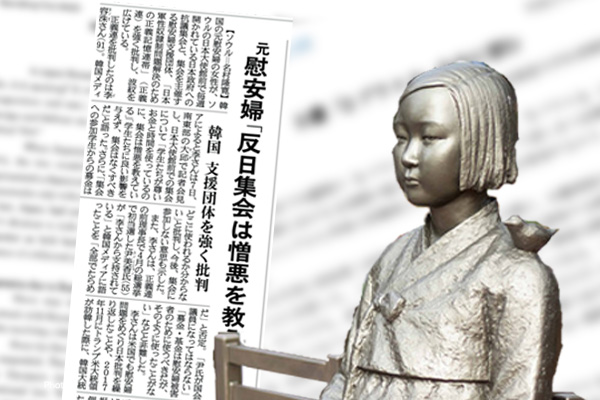In South Korea, former comfort woman Lee Yong Soo has harshly criticized Yoon Mee Hyang, a former leader of a powerful comfort women support group, for the group’s unspecified spending of donations and other allegations, leading to the revelation of suspicions about accounting fraud, donation embezzlement and political exploitation of the group’s activities. At last, prosecutors have launched full-fledged investigations into those suspicions.
Mounting suspicions including donation misappropriation
The group, the Korean Council for Justice and Remembrance (formerly called Korean Council for the Women Drafted for Military Sexual Slavery by Japan), made problematic accounting reports including an imbalance between revenues and expenditures. A beer hall and a funeral company managers testify that payments from the group were contributed back to the group, leading to suspicions about kickbacks.
Given the group’s use of Yoon’s personal bank account for collecting donations, her deposits worth 300 million won (about $240,000), her cash purchase of a condominium unit worth 200 million won (about $160,000) and her daughter’s education at a U.S. university costing 100 million won (about $80,000) a year, donations to the group are suspected to have been misappropriated.
Furthermore, it has been revealed that Yoon cooperated with her husband and his fellow pro-Pyongyang activists in attempting to persuade woman restaurant employees defected from North Korea to go back to the North. Surprisingly, her husband and his associates have reportedly sung North Korean revolutionary songs and admired North Korean dictatorship.
Former comfort woman Lee has also claimed that the group’s Wednesday rallies in front of the Japanese Embassy in Seoul stoke hatred and fail to resolve the comfort woman issue and that Yoon should not serve as National Assembly legislator after winning an assembly seat as a proportional-representation candidate of the ruling camp in a general election in April.
However, problems are not limited to Yoon’s and others’ hypocrisy. While Japanese and South Korean mass media remain silent, a factor behind Lee’s criticism of Yoon is that the comfort women issue itself has increasingly become revealed as a myth.
Build a momentum for breaking down the myth
Lee has recently been reported to have complained that Yoon and the comfort women support group have failed to defend her at a time when the authenticity of her testimony as a former comfort woman has been doubted in South Korea.
In the support group’s collection of testimonies by former comfort women published in 1993, Lee said that she had run away from home because of poverty and followed a Japanese trafficking broker to become a comfort woman and that she had been happy to receive a red one-piece suit and leather shoes from the broker. Later, however, she changed the story and said she had been coercively recruited by Japanese military. In 2018, Hwang Ui Won, a reporter for the “Media Watch” Internet news site, investigated this point and made a long report. Then, Yoon and her group began to distance themselves from Lee, instead of protesting the Hwang story.
“Anti-Japan Tribalism,” a bestseller published in South Korea and Japan last year, denied comfort women as coercively recruited sex slaves and described those women as poverty-caused human trafficking victims. Since last December, journalist Hwang and “Anti-Japan Tribalism” authors have held a rally every Wednesday to call for removing a comfort woman statute in front of the Japanese Embassy, countering a weekly rally by the comfort women support group. Picking up the group’s collection of former comfort women’s testimonies, they have asserted that the so-called coercive recruitment of comfort women as sex slaves was a fiction and that comfort women were those who were trafficked due to poverty.
In Japan, campaigns that the Asahi Shimbun newspaper and others triggered in the 1990s to portray comfort women as coercively recruited by Japanese military have become widely known as a fake. I am breathlessly watching if the time is coming for the force of truth to break down a lie in South Korea at last,
Tsutomu Nishioka is a senior fellow and a Planning Committee member at the Japan Institute for National Fundamentals and visiting professor at Reitaku University. He covers South and North Koreas.


